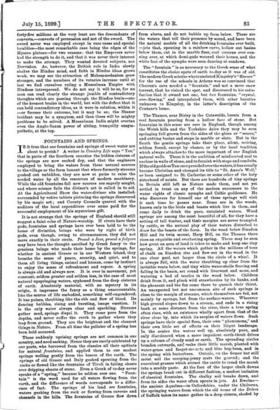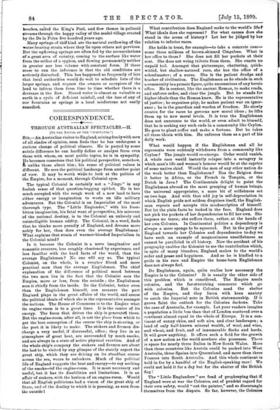FOUNTAINS AND SPRINGS.
IS it true that our fountains and springs of sweet water are about to perish ? A writer in Country Life says "Yes," that in parts of the Southern counties the hidden cisterns of the springs are now sucked dry, and that the engineers employed to bring tbe waters from these natural sources to the village or the farm lament that where formerly streams gushed out unbidden, they are now at pains to raise the needed water by all the resources of modern machinery. While the old fountains fail new sources are eagerly sought, and where science fails the diviner's art is called in to aid. At the Agricultural Show the water-diviner sits installed. surrounded by votive tablets picturing the springs discovered by his magic art ; and County Councils quarrel with the auditors of the local expenditure over sums paid for the successful employment of his mysterious gift.
It is not strange that the springs of England should still suggest a faint echo of Nature-worship. If rivers have their gods, fountains and springs have ever been held to be the home of divinities, beings who were by right of birth gods, even though, owing to circumstances, they did not move exactly in their circle. Procul a Jove, procul a fulgure may have been the thought ascribed by Greek fancy to the gracious beings who made their home by the springs, for whether in ancient Greece or in our Western island, they breathe the sense of peace, security, and quiet, and to them all living things, animal and human, come by instinct to enjoy the sense of refreshment and repose. A spring is always old and always new. It is ever in movement, yet constant, seldom greater and seldom less, in the case of most natural upspringing waters, syphoned from the deep cisterns of earth. Absolutely material, with no mystery in its origin, it impresses the fancy as a thing unaccountable, like the source of life embodied, something self-engendered. It has pulses, throbbing like the ebb and flow of blood. Its dancing bubbles, rising and bursting, image emotion. It is the only water always clear and sparkling. Streams gather mud, springs dispel it. They come pure from the depths, and never suffer the earth to gather where they leap from ground. They are the brightest and the cleanest things in Nature. From all time the polluter of a spring has been held accursed.
These suddenly uprising springs are not common in our country, and need seeking. Hence they are rarely celebrated by our poets, who borrowed from the classics all their epithets for natural fountains, and applied them to our modest springs welling gently from the bosom of the earth. The springs of old Greece and Italy gushed spouting from the rocks or flowed like the fountains of Tivoli in falling sheets over dripping shoots of stone. Even a Greek of to-day never speaks of a "spring," because he seldom sees one. " Foun- tain " is the word used for all waters flowing from the earth, and the difference of words corresponds to a differ- ence of fact. The springs of his land are fountains, waters gushing from the rock or flowing from caverns and channels in the hills. The fountains of Greece flow down from above, and do not bubble up from below. These are the waters that tell their presence by sound, and have been the natural models of all the drinking fountains ever built, —jets that, spouting in a rainbow curve, hollow out basins below them, cut in the marble floor, cool cisterns ever run- ning over, at which demi-gods watered their horses, and the white feet of the nymphs were seen dancing at sundown.
The " fountain " is as necessary to the Greek sense of what constitutes the choice spots of earth to-day as it was of old. The modern Greek scholar who translated Kingsley's " Heroes" for the use of the schools in Athens was so convinced that Cheiron's cave needed a "fountain." and not a mere snow torrent, that he visited the spot, and discovered to his satis- fac:ion that it owned not one, but two fountains, "crystal, ever-flowing," and interpolated them, with other beauties unknown to Kingsley, in the latter's description of the Centaur's home.
The Thames, near Bisley in the Cotswolds, bursts from a real fountain pouring from a hollow face of stone. But fountains in this sense are rare in England, though among the Welsh hills and the Yorkshire dales they may be seen springing full grown from the sides of the glens or " scarrs," and cutting basins and steps in marble or slate. But in the South the gentle springs take their place, silent, retiring, seldom found, except by chance, or by the local tradition which always attaches to the more important of our English natural wells. These it is the ambition of misdirected zeal to enclose in walls of stone, and to furnish with steps and conduits. If the old goddess Tan once presided over th e waters, it has usu ally become Christian and changed its title to "St. Anne's Well,' or been assigned to St. Catherine or some other of the holy sisterhood of saints. But there are hundreds of tiny springs in Britain still left as Nature made them, and not yet settled in trust on any of the modern successors to the water rights of classic nymphs and Celtic goddesses. He who discovers for himself one of these springs will visit it each time he passes near. Some are in the woods, known only to the birds and beasts which live in them, and come daily to drink the pure, untainted waters. Wood springs are among the most beautiful of all, for they have a setting of tall timber, and their margins are never trampled by cattle, or the natural play of their waters disturbed to draw for the beasts of the farm. In the wood below Sinodun Hill and its twin mount, Harp Hill, on the Thames there rises an exquisite and everlasting spring. There may be seen how great an area of land it takes to make and keep one tiny spring. All the waters which gather in the millions of tons of chalk on Sinodun rise and flow out in the wood in the one clear pool. not larger than the circle of a wheel. It is always full, with the water throbbing up clear from the invisible vents below, and tiny white water-shells floating and falling in the basin, set round with liverwort and moss, and watering a bed of teazles in the wood below. Children drink from it, and pluck wild strawberries by its banks, and the pheasant and the fox come there to quench their thirst. An unexpected but not uncommon site of such springs is close to the margin of streams, which themselves are fed, not mainly by springs, but from the surface-waters. Wherever high ground slopes down to a stream, and ends in a rising bank at some distance from the river, there a true spring often rises, with an existence wholly apart from that of the river close by, into which its surplus of waters flows. Such springs have their special flora, their own " phenomena," and their own little set of effects on their liliput landscape. In the centre the waters well up, absolutely pare, and only discoloured when a more impatient earth-throb drives up a column of cloudy sand or earth. The spreading circles broaden outwards, and make their little marsh, planted with water-grass and forget-me-nctz and blue bog-bean, and in the spring with butterburs. Outside, on the firmer but still moist soil the creeping-jenny mats the vornd ; and the succulent grasses which attract the cattle to tread the marsh into a muddy paste. At the foot of the larger chalk downs the springs break out in different fashion, a modest imitation of classical fountains. The chalky soil breaks down, and from its sides the water often spouts in jets. At Ewelme- the ancient Aquelma—in Oxfordshire, under the Chilterns, the springing waters from which the old home of the Dukes of Suffolk takes its name gather in a deep cistern, shaded by beeches, called the King's Pool, and flow thence in pellucid streams through the happy valley of the model village created by the De la Poles five hundred years ago.
Many springs of thig'kind are the natural ontflowing of the water-bearing strata where they lie upon others not pervious. But the npflowing springs are often fed by the accumulations of a great area of cohntry, coming to the surface like water from the orifice of a syphon, and flowing permanently neither in greater nor less volume with constant foroe. If these cease to run the inference is that the old conditions are seriously disturbed. This has happened so frequently of late that local authorities would do well to schedule lists of the larger springs, and request the owners or occupiers of the land to infdrm them from time to time whether there is a decrease in the flow. Stored water is almost as valuable as earth in a cycle of deficient rainfall, and the loss of any of our fountains or springs is a local misfortune not easily remedied.







































 Previous page
Previous page